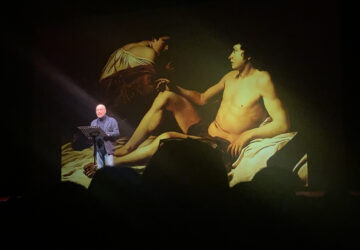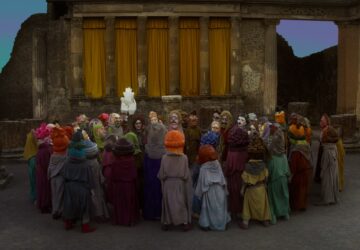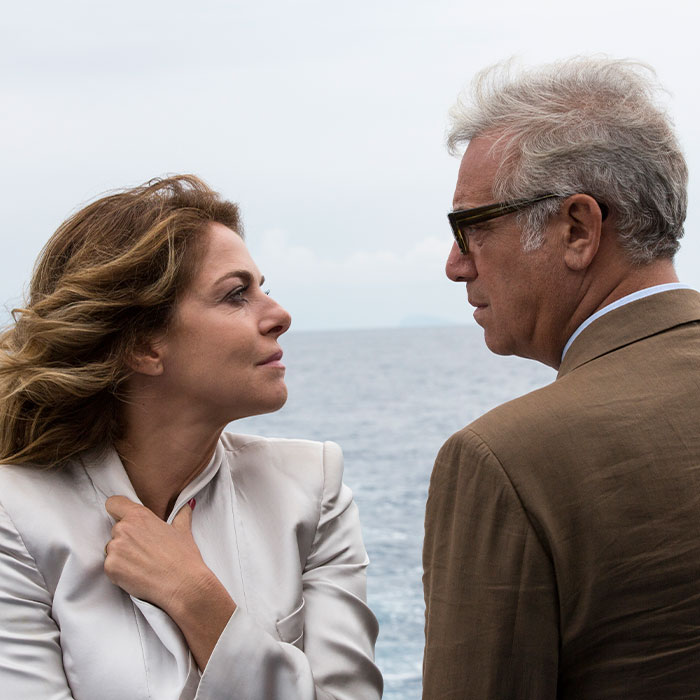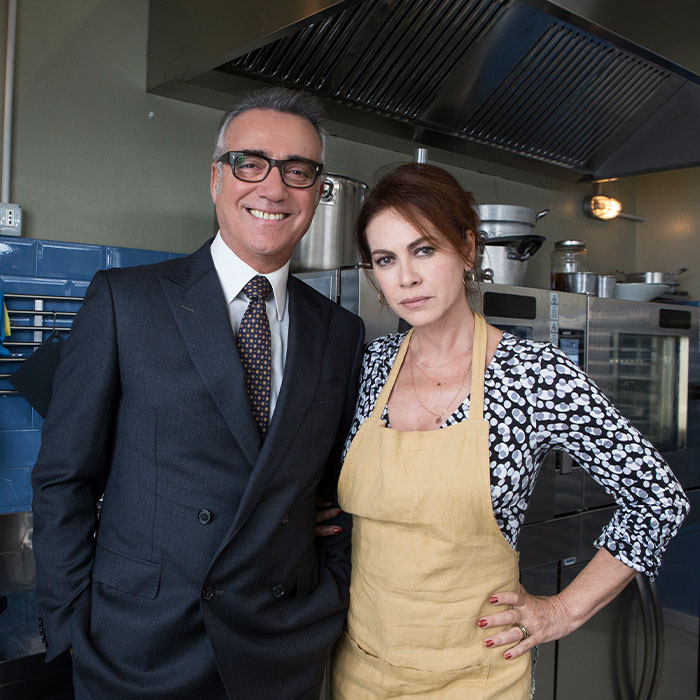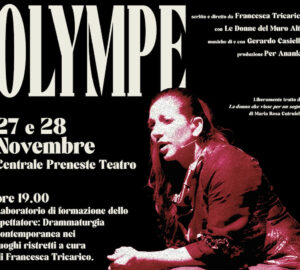MASSIMO GHINI – «We are creators of emotions»
Forty years of career and still a great desire to grind dust on sets and stages. Massimo Ghini needs no introduction. He surprised us for the affability with which he placed himself in conversation, going through some of the fundamental stages of his life, always with a lucid and ironic look on himself and on our Italy.

Love challenges. It’s him who reveals it to us and has already demonstrated it. Among these, “Vivi e lascia vivere” (broadcast on Rai1 from 23/04) marks the debut on the small screen of a director like Pappi Corsicato. «In recent years a constructive dialogue has opened between authors, intellectuals and TV and we have only to gain. For me it was the first opportunity to enter the Pappi universe; with the other interpreters we knew what we were going towards and we put ourselves at the service. The main characteristic of the television work is that the narrative must respect production times as an assembly line. This experience with him has left me with a way of telling, always keeping in mind not to ‘fall’ into a type of professional approach from a television routine, from which I already shy away from mine. Every time we looked for the ‘easier’ way, he intervened to get the best, which made everything more stimulating and I say it as an old sailor wolf». With regard to fiction, he reveals that «from the beginning, he was struck by the fact that the story had a character of morbidity and mystery, but also of play: an area in which a director like him moves very well. Reading the play I thought: “we are starting to do something different for Rai1 too!”. I feel I can say that being one of the pillars of the network, even if we have always moved in an area of ’comfort’. Clearly the comparison with the new platforms has encouraged Rai to experiment, while taking into account what Italians love. In “Vivi e lascia vivere” you navigate within the human soul, describe it and contradict it». In the notes, Corsicato highlighted that the theme of this series is change: «Coronavirus has forced us to change our lifestyle, to relate to others and to ourselves in a totally different and new way. I don’t want to make a comparison that is perhaps too risky but “Vivi e lascia vivere” […] is able to make us reflect on the fact that we must be capable, even when such a devastating event breaks into our lives, to find the positive side».

I n this regard, the actor, who embodies Toni, asserts «In this situation we have a duty: to continue being artists and at the same time to assume the responsibility of citizens and human beings. Sometimes our life is far from reality: we are creators of emotions. Despite the effort of this profession, we always live in a ‘privileged’ condition because we are known or have had a certain type of career; but also on this so-called privilege we would have to discuss, especially for the difficult and delicate situation that the world of Culture and Entertainment in Italy is experiencing. In particular, the phase we are going through gives me some terror for the future, taking into account how our local production system has always worked. A positive aspect could also be traced: in this condition perhaps some knots will come to a head that cannot continue to be ignored. We need to rethink the function of TV which must be entertainment, but also culture, in an all-inclusive sense. It is necessary to rebuild a fabric thinking of the young, the elderly, who will have to start working again». “Vivi e lascia vivere” could be a motto and precisely on this point Ghini does not hide us, in conscience, that “at this moment, such a phrase, also has its responsibility for this I thought about it a lot, it seems almost a warning to the whole of Europe». One aspect that is being investigated in this fiction is trust. Looking at his path, it arises spontaneously to ask him a question about this. He tells us: «I had teachers. I had just failed the entrance exam to the Academy of Dramatic Art that I wanted to attend, so I decided to go to Milan. It was other years, in the sense that in order to really work, people bent over backwards. I auditioned at the Piccolo Teatro for “Re Lear” and Strehler took me. He gave me a huge injection of confidence. He provided me a lessons of crazy life and humanity and nurtured immense respect for the public, creating shows – even long ones – that met the favor of a very large audience, from good ladies to workers. I also had the good fortune to relate to Gassman and it is as if I had done the academy with him. Zeffirelli helped me to reach an international dimension, he ‘provided my wings’ to enter a fantastic world, making me feel deserving to be there. Then there were prejudices: if you came from the theater they did not consider you suitable for cinema; but Carlo Lizzani was not influenced: thanks to him I won my first prize for best actor for “Un’isola” at the Karlovy Vary festival. The turning point, from the point of view of experts and public perception, came with “Compagni di scuola”. “I came from having already made 4-5 feature films – presented at European festivals – so I was considered a niche actor in the environment. We knew each other with Christian (De Sica), who estimated me to spend a lot. Carlo (Verdone) said to me: “I propose this character to you (Hon. Mauro Valenzani, edit), which however does not make you laugh”. I joined the project with great enthusiasm; the cast included three quarters of the Italian cinema of the time». Then there was the whole adventure with Paolo Virzì, Alessandro D’Alatri and Neri Parenti – with the latter the big-grossing Christmas films. Everyone gave me something and I hope I did the same. He focuses mainly on Virzì and D’Alatri belonging to his generation. He found himself participating in the work before both: “I was bringing something because they were still unknown and I an emerging actor, there was a do ut des on a trust level. We have earned our space and our credibility».

As for television, I dealt with those who knew this medium as well as Giorgio Capitani with whom we reached quality peaks – just think of roles like Galeazzo Ciano and Enrico Mattei – which have given me popularity along with fiction such as “Raccontami”». Recently “A casa tutti bene” by Gabriele Muccino offered an even different image of Ghini, who gratefully comments: “I owe a great deal to Gabriele, also because through his film, after 90 titles on his shoulders, I received for the first time turns the nomination to David di Donatello and a Nastro d’Argento – in this case for his career. Sandro’s role was a challenge, I still receive letters from people who are experiencing the experience of Alzheimer’s with their family members».
Massimo Ghini does not set limits on a professional level: «Everything must remain within the sphere of the choice I have made: being an artist. It is a decision of great responsibility, which imposes a precarious condition on you. We must not look only at the element of notoriety. It is a neurotic profession, played on everyone’s sensitivity, where maintaining a balance between life decisions and the need for survival is not easy. The limits, when I was able to afford them, I set them with respect to staying in a quality environment. However, our journey is also made of very normal needs, we have to live off our work: if I have to provide for a large family, I have to earn and this has influenced me in some moments. I have no shame in saying it. I have always misled» and it seems to tell us with the pride of those who made themselves, but also of those who, perhaps, paid the price for some prejudices. «I left with Strehler, I didn’t make cellars, I made my debut in Paris. I had a truly wonderful start and the experience led me – and leads me – to cross works of any kind, from the dramatic films of the great international authors to those of Christmas, from comedies with Gassman to musical comedy. This is a trait that in Italy displaces, it is more comforting for us to have a specialization. I believe that an artist should not set boundaries, the limit must be suggested by your conscience with respect to what you think you are doing. An artist, when he is an artist, lives by his talent if he can cure it and also manage his own crises and moments of despair… how many I have not received. Compared to what I was doing, I tried to be coherent and not hypocritical (and want to continue along this line, edit). Gassman has sent me several teachings including this: “We actors have brains like everyone else, only that one part is obtuse and that allows us to get on a table and recite a song of the Divine Comedy in front of a thousand people”.
I had the greatest hits playing bad characters: lately with Sorrentino’s “The New Pope” I received incredible gratifications giving life to the worst man in the story told (Spalletta) – previously I had given body to Pope John XXIII. the two extremes touch each other». Before the cinemas and theaters closed, the Roman actor was in the room with “La mia banda suona ilpop”. Another feature – very moving – is on stand-by: “La volta buona” directed by Vincenzo Marra. «It was a tiring film in the best sense of the word because with the director we worked a lot on building my role. The script made me think of the films of the Italian comedy, written by Vincenzoni and directed by Dino Risi. My Bartholomew is Sordian and Manfredian. The spectator is faced with the cynicism that leads the characters to perform reprehensible acts and then find themselves dealing with their own conscience». With a view to getting involved, Ghini made his theater directorial debut in 2015 with “un’ora di tranquillità” by Florian Zeller, «an excellent writer. Text is an extraordinary machine. It was all black on white, you had to go along with it, I had ideas regarding the staging. It was a challenge to bring it to our stages not being the great known classic. It is a farce, but it is very neo-realistic, we laugh about a reality we live in». He reveals that he has tried to propose a film project as a director, but he has not been given the opportunity and we hope that it will happen soon. «You have to earn the chance to make others understand that you could play a role that you have not yet played. I confess: I had to work hard to get a 360 ° consideration. I’m not complaining (it’s important not to be misunderstood). We lack the idea that there is in the American cinema of playing and experimenting (in the sense of ‘to play’) and it would be nice if it were established».
